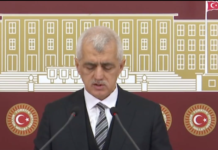Three people in Turkey died by suicide on the same day, reportedly as a result of depression caused by actions of the Turkish government, which, following a coup attempt on July 15, 2016, carried out a massive purge of state institutions, Turkish Minute reported.
Ömer Faruk Gergerlioğlu, a human rights advocate and Peoples’ Democratic Party (HDP) MP, on Friday announced in a tweet that 48-year-old Fatma Demirel, a mother of one and a former healthcare worker who was fired from her job by an emergency decree, had died by suicide in her house in Diyarbakır.
“How many times have they [purge victims] taken their own lives out of desperation? … The genocide continues, [while] the public and the authorities remain silent,” Gergerlioğlu tweeted.
According to Turkish media reports, a university student whose parents had been fired from their jobs as public servants and a high-school student whose father was dismissed from the Turkish Armed Forces (TSK) both lapsed into depression and killed themselves on Friday in Denizli and Uşak provinces, respectively.
Following the coup attempt in 2016, the ruling Justice and Development Party (AKP) declared a state of emergency and carried out a massive purge of state institutions, summarily dismissing by means of emergency decree-laws more than 150,000 public servants including academics, teachers, military personnel, diplomats and police officers, for alleged membership in or relationships with “terrorist organizations.”
The government also shut down 164 media organizations, 1,058 educational institutions and 1,769 NGOs.
Former public servants were not only fired from their jobs; they were also prohibited from working again in the public sector and getting a passport. The government also made it difficult for them to work formally in the private sector. Notes were put on the social security database about dismissed public servants to deter potential employers.
According to a joint report by the Justice for Victims Platform and lawmaker Gergerlioğlu, the two-year-long state of emergency declared after the failed putsch caused immense suffering among public servants who were dismissed from their jobs by the government as well as their families.
The dismissed civil servants lost 70 percent of their average monthly income, a circumstance that reduced them to dire financial straits, according to a survey conducted for the report.
The survey indicates that 99.1 percent of the victims are college or university graduates or holders of master’s or doctoral degrees, which means an immense loss of human resources for Turkey’s public administration.
According to the victims’ family members taking part in the survey, the biggest problem they have been facing is economic hardship (97.9 percent) followed by psychological problems (88.6 percent), loss of social prestige and social exclusion (83.7 percent), disintegration of social circles (83.1 percent), unemployment/lack of employment (80.4 percent) and lack of social security (73.2 percent).
Although it is not certain how many former public servants have died by suicide, the most recent report published by Veli Ağbaba from the main opposition Republican People’s Party (CHP) said there were at least 46 known cases. Other sources say there are many as 100 cases of suicide among dismissed civil servants.















